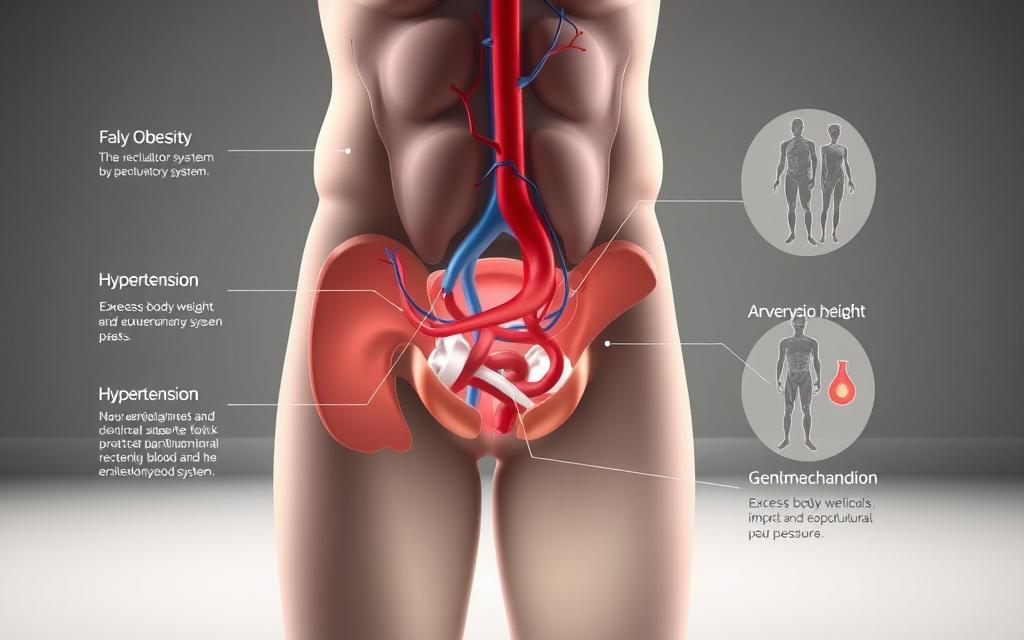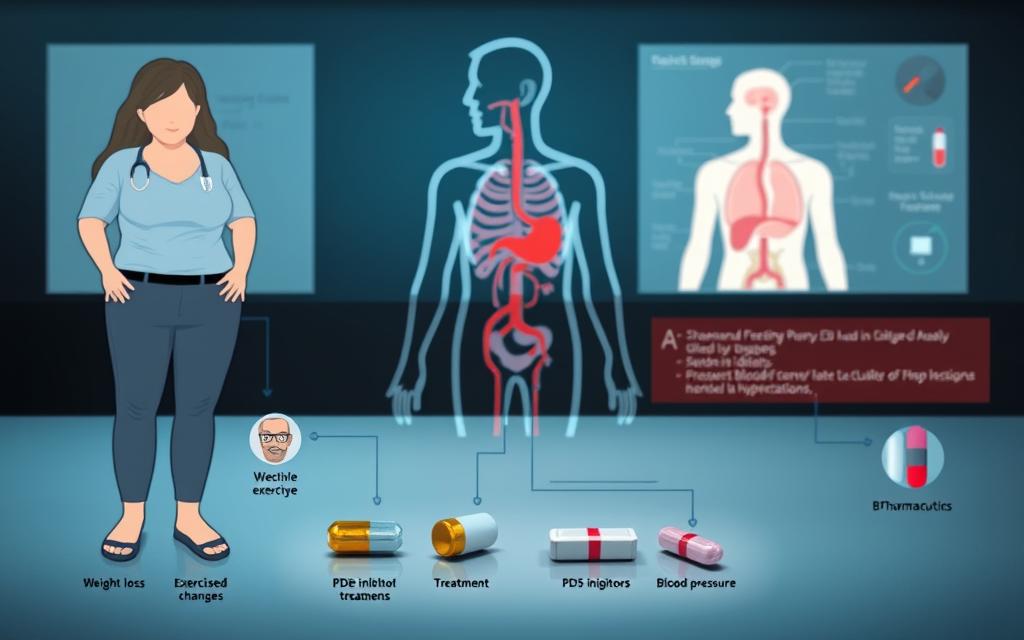Does High Blood Pressure Cause Erectile Dysfunction? Exploring the Connection
High blood pressure is a significant health concern that affects millions of people worldwide, including in the United States. It is often associated with various health complications, but one of its lesser-discussed impacts is on sexual health, particularly erectile dysfunction.
The link between hypertension and sexual function is complex. Research suggests that high blood pressure can damage blood vessels, reducing blood flow to the penis and potentially leading to erectile issues.
Understanding this connection is crucial for managing both conditions effectively. By exploring how high blood pressure influences erectile function, individuals can better navigate their health and seek appropriate medical advice.
Understanding Erectile Dysfunction and Its Causes
Understanding the complexities of erectile dysfunction requires a deep dive into its definition and underlying physiological causes. Erectile dysfunction (ED) is a condition that affects a significant number of men, causing distress and impacting their quality of life.
What Defines Erectile Dysfunction
Erectile dysfunction is characterized by the inability to achieve or maintain an erection sufficient for satisfactory sexual performance. This condition can be occasional or persistent, and its severity can vary among individuals.
Common Physiological Causes
The physiological causes of erectile dysfunction are varied and complex. They can be broadly categorized into several key areas.
Vascular Issues
Vascular issues are a major contributor to erectile dysfunction. Problems with blood flow, often due to conditions like hypertension or atherosclerosis, can significantly impact erectile function.
Hormonal Factors
Hormonal factors, particularly low levels of testosterone, can also play a crucial role in the development of erectile dysfunction. Hormonal imbalances can affect libido and erectile function.
The interplay between these physiological causes can be complex. For instance, vascular issues can be compounded by hormonal factors, leading to a higher risk of developing erectile dysfunction.
| Cause | Description | Impact on ED |
|---|---|---|
| Vascular Issues | Problems with blood flow due to hypertension or atherosclerosis | Significant impact on erectile function |
| Hormonal Factors | Low testosterone levels or hormonal imbalances | Affects libido and erectile function |
The Correlation Between Being Overweight and Erectile Dysfunction
The link between being overweight and erectile dysfunction is a growing concern. As obesity rates continue to rise, understanding this correlation becomes increasingly important for overall health and wellbeing.
How Excess Weight Affects Sexual Health
Excess weight, particularly around the abdominal area, can significantly impact sexual health. It can lead to hormonal imbalances and vascular problems, both of which are critical factors in erectile dysfunction. Furthermore, being overweight can result in decreased libido and reduced sexual satisfaction.
Carrying excess weight puts additional strain on the body’s systems, including the cardiovascular system, which is crucial for erectile function. Vascular health is essential for achieving and maintaining an erection, and excess weight can compromise this.
Statistical Evidence Linking Weight and ED
Numerous studies have demonstrated a clear link between being overweight and an increased risk of erectile dysfunction. Let’s examine some of the key findings.
Research Findings and Studies
Research has consistently shown that men with higher body mass indexes (BMIs) are more likely to experience erectile dysfunction. A study published in the International Journal of Impotence Research found a significant correlation between BMI and the risk of ED.
Risk Increases with BMI
- A BMI of 25-29.9 (overweight) increases the risk of ED.
- A BMI of 30 or higher (obese) significantly raises the risk of developing erectile dysfunction.
The statistical evidence underscores the importance of maintaining a healthy weight to reduce the risk of erectile dysfunction. By understanding this correlation, individuals can take proactive steps towards improving their sexual health and overall wellbeing.
High Blood Pressure as a Risk Factor for ED
Understanding how high blood pressure affects erectile dysfunction requires a closer look at vascular health. High blood pressure, or hypertension, is a condition that can significantly impact the body’s ability to maintain healthy blood flow, which is crucial for erectile function.
How Hypertension Impacts Blood Flow
Hypertension can damage the inner lining of blood vessels, making them less flexible and more prone to narrowing. This process, known as atherosclerosis, can restrict blood flow to the penis, making it difficult to achieve and maintain an erection. The impact of hypertension on blood flow is a key factor in the development of erectile dysfunction. When blood vessels are healthy, they can relax and dilate to allow increased blood flow. However, with hypertension, this process is impaired.
The Vascular Connection to Erectile Function
The vascular connection to erectile function is critical because an erection is primarily a vascular event. It requires the coordinated effort of blood vessels, nerves, and hormones. The vascular system’s health directly influences the ability to achieve an erection. When hypertension damages the blood vessels, it can disrupt this delicate balance, leading to erectile dysfunction.
| Condition | Effect on Blood Vessels | Impact on Erectile Function |
|---|---|---|
| Normal Blood Pressure | Healthy, flexible vessels | Normal erectile function |
| Hypertension | Damaged, less flexible vessels | Increased risk of erectile dysfunction |
The Interplay Between Obesity, Hypertension, and ED
Understanding the interplay between obesity, high blood pressure, and erectile dysfunction is crucial for developing effective treatment plans. These conditions are interconnected through various physiological mechanisms.
Shared Physiological Mechanisms
Obesity and hypertension share common pathways that can lead to erectile dysfunction. Inflammation and endothelial dysfunction are key factors. When an individual is obese, it can lead to chronic inflammation, which in turn damages the endothelium, the lining of blood vessels. This damage impairs blood flow, a critical component for erectile function.
Insulin resistance, often associated with obesity, further complicates the situation by contributing to hypertension and vascular dysfunction.

Metabolic Syndrome and Its Sexual Health Implications
Metabolic syndrome, a cluster of conditions including high blood pressure, obesity, and insulin resistance, significantly increases the risk of developing erectile dysfunction. For more information on how blood pressure affects erectile dysfunction, visit Colorado Urologists.
| Condition | Impact on Erectile Function |
|---|---|
| Obesity | Increases inflammation and impairs blood flow |
| Hypertension | Damages blood vessels, reducing erectile function |
| Metabolic Syndrome | Combines multiple risk factors, significantly increasing ED risk |
Other Health Conditions That Link Weight, Blood Pressure, and ED
In addition to weight and blood pressure, other health conditions play a significant role in erectile dysfunction.
Understanding these conditions can provide a more comprehensive view of the factors contributing to ED. Two critical health issues that are closely linked to erectile dysfunction are diabetes and heart disease, often associated with high cholesterol levels.
Diabetes and Its Dual Impact
Diabetes is known to affect erectile function in multiple ways. High blood sugar levels can damage blood vessels and nerves, impairing the ability to achieve an erection. Moreover, diabetes often coexists with other conditions like hypertension and obesity, further complicating the situation.
Cholesterol, Heart Disease, and Erectile Function
High cholesterol can lead to atherosclerosis, a condition where plaque builds up in the arteries, restricting blood flow. This process can affect the arteries supplying blood to the penis, leading to erectile dysfunction. Heart disease, often a result of high cholesterol and hypertension, shares similar underlying vascular issues, making it a significant risk factor for ED.
Treatment Options for ED Related to Weight and Blood Pressure
A combination of medical treatments and lifestyle changes can help alleviate erectile dysfunction associated with weight and blood pressure issues. Addressing these underlying health concerns is crucial for effective management.
Medication Approaches
Medications play a significant role in treating both erectile dysfunction and high blood pressure. For ED, specific medications are designed to enhance erectile function.
ED Medications
ED medications, such as sildenafil (Viagra) and tadalafil (Cialis), work by increasing blood flow to the penis. These are effective for many men but should be used under medical supervision.
Blood Pressure Medications
For high blood pressure, medications like ACE inhibitors and beta-blockers can help manage hypertension. Some blood pressure medications may have a positive effect on erectile function, although this can vary.
Lifestyle Modifications That Improve Both Conditions
Making significant lifestyle changes can improve both erectile dysfunction and high blood pressure. Key modifications include dietary changes, increased physical activity, and weight management.
| Lifestyle Change | Impact on ED | Impact on Blood Pressure |
|---|---|---|
| Weight Loss | Improves erectile function | Lowers blood pressure |
| Regular Exercise | Enhances overall sexual health | Helps manage hypertension |
| Dietary Changes | Supports vascular health | Contributes to blood pressure control |

Preventing ED Through Weight Management and Blood Pressure Control
Maintaining a healthy weight and controlling blood pressure are crucial steps in preventing erectile dysfunction. By adopting a healthy lifestyle, individuals can significantly reduce their risk of developing ED. This involves making informed choices about diet and exercise.
Dietary Approaches
A balanced diet rich in fruits, vegetables, whole grains, and lean proteins can help manage weight and blood pressure. It’s also beneficial to limit the intake of processed foods, sugars, and saturated fats. For more information on how specific nutrients can impact erectile health, visit Colorado Urologists for insights on vitamins for erectile dysfunction.
Exercise Recommendations
Regular physical activity is essential for weight management and overall cardiovascular health, which in turn supports erectile function. Activities such as brisk walking, cycling, or swimming for at least 150 minutes per week can make a significant difference. Incorporating strength training exercises can further enhance overall health.
Conclusion: Taking Control of Your Health and Sexual Wellbeing
Taking control of your health is crucial for maintaining sexual wellbeing. The connection between high blood pressure, being overweight, and erectile dysfunction is complex, but understanding these links can empower individuals to make informed lifestyle choices.
By managing weight and blood pressure, individuals can significantly reduce the risk of developing erectile dysfunction. This involves adopting a balanced diet and regular exercise routine, which not only improves overall health but also enhances sexual function.
Healthcare providers, such as the American Heart Association and the American Urological Association, recommend comprehensive approaches to managing these conditions. By focusing on overall health and wellbeing, individuals can improve their sexual health and quality of life.
Ultimately, taking proactive steps towards a healthier lifestyle can lead to improved sexual wellbeing and a reduced risk of erectile dysfunction. By prioritizing health, individuals can regain control over their wellbeing and enjoy a more fulfilling life.
